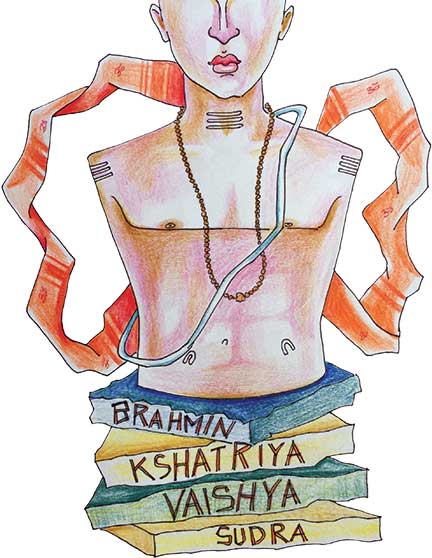Apoorvanand
I became aware of caste very late in life. Even after having gone through the “Yagyopaveetsanskar’ (sacred thread ceremony), the understanding that by being twice-born (Brahmins are Dwij) I had acquired an exalted position in the Indian social system had not struck me. Jokes used to be cracked about how without the janeu (sacred thread), the Brahmin male body looked like an ‘Ahir’s’ (OBC) body, but I never realized the grim and vile nature of such exchanges.
We lived in a neighbourhood that housed people from different castes and that perhaps is one reason why my sister, brother, and I remained blissfully unaware of our special status in society. We also never witnessed our parents discriminating against our neighbours. We had Kumhars, Sunars, and one ‘bhadbhunjaavala’ family for neighbours. We lived in Turha Toli, an area known by its association with a caste of people who are in the business of trading in vegetables.

I find it very strange that my parents did not think it necessary to tell us about the caste reality we were part of. I distinctly remember the first time I was asked about my caste and I did not have an answer. That was the day I found out that I had a caste and it was known as Brahmin. But even at that point, caste was not a big part of our everyday lives. We were also brought up on the stories of Khattar kaka, a character created by the legendary Maithili writer Harimohan Jha. Jha was a harsh critic of the Brahmanical ideology and practices and a great votary of rationalism.
Caste, however, was all around us. I recall the horror that struck me when I saw a few policemen grabbing hold of one of our Kumhar neighbuor’s children. They held the child upside down over a well to terrorize the family and force them to disclose the whereabouts of the father. This image has not left me. I understood much later that caste was very much present in this picture.
We had a new teacher in our school. He was known, alternatively, as navaku (new) master sahab and mochi (cobbler) master sahab. No other teacher was ever identified by her/his caste. Was he discriminated against? We, as small children, had no way to know or comprehend. But now I realize the discrimination began with his identification.
During my high school days, I became friends with TM. TM was a Dalit. Interacting with him made me aware of the ugliness and violence of our caste-driven society. And that I was a part of it. My friend was brutally frank about his caste. It was almost scandalous and I could not reconcile with his reality. As a teenager, to come to terms with the fact that we actually lived in two different worlds was a huge shock.
TM was fair and very handsome. A sarcastic smile always used to play on his lips. It made me uncomfortable. His tone used to unsettle me. But I often wondered about the coolness with which he could discuss what he had been facing and coping with. His fair complexion drew derision from his upper caste villagers. They abusively kept telling him that he was not the ‘beej’ (seed) of his father. He was not allowed to ride his bicycle on the roads and lanes where the upper caste people lived.
TM was one of the best students in class. We went from DAV high school to DAV college to do our higher secondary together. He wanted to become an engineer, wrote the entrance exam, and secured a seat at the prestigious BIT Mesra.
TM managed to enroll himself despite severe financial constraints, but it was impossible for him to continue there as he had no money. I had moved to Patna to do my undergraduation at the Patna University. Aware of TM’s financial situation, I tried to help him. We were told that there were special schemes for scheduled caste students. There were scholarships that he could avail. But we didn’t know how or where to apply for them. We were advised to meet the chief minister to appeal to him for financial support to enable TM to continue with his engineering course. I still remember the harsh sun under which we waited for the CM to appear in the Janata Darbar. We almost fainted and returned empty-handed.
TM went back to Mesra. After that we lost touch. My repeated attempts to reach him failed. It was as if he had disappeared or did not ever exist in my life. He had decided to make a complete break from his past. I kept trying to get information about him. Much later, I came to know that he had to drop out of BIT. He was forced to take a clerical job in some bank.
TM was part of my youth but he made a conscious decision to cut himself off from my world. It was a message that we did not belong to the same world.
This was my first encounter with the world of caste. Ever since, the consciousness of caste has stayed with me.
The author teaches Hindi at Delhi University and is a writer. He can be reached at katyayani.apoorv@gmail.com.
